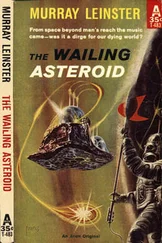Мюррей Лейнстер - The Machine That Saved The World
Здесь есть возможность читать онлайн «Мюррей Лейнстер - The Machine That Saved The World» весь текст электронной книги совершенно бесплатно (целиком полную версию без сокращений). В некоторых случаях можно слушать аудио, скачать через торрент в формате fb2 и присутствует краткое содержание. Год выпуска: 2016, Издательство: epubBooks Classics, Жанр: Фантастика и фэнтези, на английском языке. Описание произведения, (предисловие) а так же отзывы посетителей доступны на портале библиотеки ЛибКат.
- Название:The Machine That Saved The World
- Автор:
- Издательство:epubBooks Classics
- Жанр:
- Год:2016
- ISBN:нет данных
- Рейтинг книги:4 / 5. Голосов: 1
-
Избранное:Добавить в избранное
- Отзывы:
-
Ваша оценка:
- 80
- 1
- 2
- 3
- 4
- 5
The Machine That Saved The World: краткое содержание, описание и аннотация
Предлагаем к чтению аннотацию, описание, краткое содержание или предисловие (зависит от того, что написал сам автор книги «The Machine That Saved The World»). Если вы не нашли необходимую информацию о книге — напишите в комментариях, мы постараемся отыскать её.
The Machine That Saved The World — читать онлайн бесплатно полную книгу (весь текст) целиком
Ниже представлен текст книги, разбитый по страницам. Система сохранения места последней прочитанной страницы, позволяет с удобством читать онлайн бесплатно книгу «The Machine That Saved The World», без необходимости каждый раз заново искать на чём Вы остановились. Поставьте закладку, и сможете в любой момент перейти на страницу, на которой закончили чтение.
Интервал:
Закладка:
"I know it can't be done!" said the sergeant desperately. "I know it can't! But it's gotta be! Or they'll parachute a transmitter down on us sure."
Graves smiled a quick and nervous smile. He began to sketch a circuit. It was a wonderful thing. It was the product of much ingenuity and meditation. It had been devised—by himself—as a brain–teaser for the amusement of other high–level scientific brains. Mathematicians zestfully contrive problems to stump each other. Specialists in the higher branches of electronics sometimes present each other with diagrammed circuits which pretend to achieve the impossible. The problem is to find the hidden flaw.
Graves deftly outlined his circuit and began to fill in the details. Ostensibly, it was a circuit which consumed energy and produced nothing—not even heat. In a sense it was the exact opposite of a perpetual–motion scheme, which pretends to get energy from nowhere. This circuit pretended to radiate energy to nowhere, and yet to get rid of it.
Presently Lecky could be heard expostulating gently:
"But of course we are willing to give you the circuit by which we communicate with the year 3020! Naturally! But it seems strange that you suspect us! After all, if you do not tell us how to meet the danger your broadcasts have told of, you will never be born!"
Sergeant Bellews mopped his face and moved into the screen's field of vision.
"Doc," he said, laying a hand on Lecky's arm. "Doc Graves is sketchin' what they want right now. You want to come show it, Doc?"
Graves took Lecky's place. He spread out the diagram, finishing it as he talked. His nervous, faint smile appeared as the mannerism of embarrassment it was.
"There can be no radiation from a coil shaped like this," he said embarrassedly, "because of the Werner Principle…. Yet on examination …input to the transistor series involves … energy must flow … and when this coil…."
His voice flowed on. He explained a puzzle, presenting it diffidently as he had presented it to other men in his own field. Then he had been playing—for fun. Now he played for perhaps the highest stakes that could be imagined.
He completed his diagram and, smiling nervously, held it up to the communicator–screen. It was instantly transmitted, of course. To nowhere. Which was most appropriate, because it pretended to be the diagram of a circuit sending radiation to the same place.
The face on the screen twitched, now. The hand with the tiny earphone was always at the ear of the man on the screen, so that he plainly did not speak one word without high authority.
" We will—examine this ," he said. His voice was a full two tones higher than it had been. " If you have been—truthful we will give you the information you wish ."
Click! The screen went dark. Lecky let out his breath. Sergeant Bellews threw off the transmission switch. He began to shake. Howell said indignantly:
"When I make a mistake, I admit it! That broadcast isn't from the future! If it hadn't been a lie, he'd have known he had to tell us what we wanted to know! He couldn't hold us up for terms! If he let us die he wouldn't exist!"
"Y–yeah," said Sergeant Bellews. "What I'm wonderin' is, did we fool him?"
"Oh, yes!" said Graves, with diffident confidence. "I don't know but three men in the world who could find the flaw in that circuit." He smiled faintly. "But it radiates all the energy that's fed into it." He turned to Sergeant Bellews. "You gave me the constants of a wave you wanted it to radiate. I fixed it. It will. But why that special type—that special wave?"
Sergeant Bellews pulled himself together.
"Because," he said grimly, "that was the wave they wanted us to broadcast. What I'm hoping is that you gave 'em a transmitter to do exactly the same thing as the one they designed for us. If they're fooled, they'll broadcast the wave they told us to broadcast. If it busts machines, it'll bust their machines. If it stops all dynamic systems dead—includin' men—they'll be stopped dead, too." Then he looked from one to another of the three scientists, each one reacting in his own special way. "Personally," said Sergeant Bellews doggedly, "I'm goin' to have a can of beer. Who'll join me?"
The world wagged on. The automatic monitors in Communications Center reported that another broadcast had been received by Betsy and undoubtedly unscrambled by Al and Gus, working as a team. The reported broadcast was, of course, an interception of the two–way talk from the Rehab Shop.
The tall young lieutenant, working with his eyes kept conscientiously shut, extracted the tapes and loaded them in a top–security briefcase. A second courier took off for Washington with them. There a certified, properly cleared major–general had them run off, and saw and heard every word of the conversation between the Rehab Shop and—nowhere. He howled with wrath.
Sergeant Bellews went into the guardhouse while plane–loads of interrogating officers flew from Washington. Howell and Graves and Lecky went under strict guard until they could be asked some thousands of variations of the question, "Why did you do it?" The high brass quivered with fury. They did not accept decisions made at non–commissioned–officer level.
Communication with their great–great–great–grandchildren, they considered, should have been begun with proper authority and under high–ranking auspices. They commanded that 2180 should immediately be re–contacted and properly authorized and good–faith conference begun all over again. The only trouble was that they could get no reply.
The dither was terrific and the tumult frantic. When, moreover, even Betsy remained silent, and Al and Gus had nothing to unscramble, the high brass built up explosive indignation. But it was confined to top–security levels.
The world outside the Pentagon knew nothing. Even at Research Installation 83 very, very few persons had the least idea what had taken place. The sun shone blandly upon manicured lawns, and the officers' children played vociferously, and washing–machines laundered diapers with beautiful efficiency, and vacuum cleaners and Mahon–modified jeeps performed their functions with an air of enthusiastic contentment. It seemed that a golden age approached.
It did. There were machines which were not merely possessions. Mahon–modified machines acquired reflections of the habits of the families which used them. An electric icebox acted as if it took an interest in its work. A vacuum cleaner seemed uncomfortable if it did not perform its task to perfection. It would seem as absurd to exchange an old, habituated family convenience as to exchange a member of the family itself. Presently there would be washing–machines cherished for their seeming knowledge of family–member individual preferences, and personal fliers respected for their conscientiousness, and one would relievedly allow an adolescent to drive a car if it were one of proven experience and sagacity….
The life of an ordinary person would be enormously enriched. A Mahon–modified machine would not even wear out. It took care of its own lubrication and upkeep—giving notice of its needs by the behavior of its standby–lamp. When parts needed replacement one would feel concern rather than irritation. There would be a personal relationship with the machines which so faithfully reflected one's personality.
And the machines would always, always, always act toward humans according to the golden rule.
But meanwhile the Rehab Shop was taken over by officers of rank. They tried frantically to resume the communication that had been broken off. Suspecting that Sergeant Bellews had shifted controls, they essayed to shift them back. The communicator which was Betsy's factory twin went into sine–wave standby–modulation, and suddenly smoked all over and was wrecked. The wave–generator went into hysterics and produced nothing whatever. Then there was nothing to do but pull Sergeant Bellews out of the clink and order him to do the whole business all over again.
Читать дальшеИнтервал:
Закладка:
Похожие книги на «The Machine That Saved The World»
Представляем Вашему вниманию похожие книги на «The Machine That Saved The World» списком для выбора. Мы отобрали схожую по названию и смыслу литературу в надежде предоставить читателям больше вариантов отыскать новые, интересные, ещё непрочитанные произведения.
Обсуждение, отзывы о книге «The Machine That Saved The World» и просто собственные мнения читателей. Оставьте ваши комментарии, напишите, что Вы думаете о произведении, его смысле или главных героях. Укажите что конкретно понравилось, а что нет, и почему Вы так считаете.











